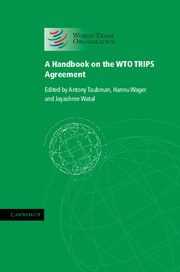Book contents
- Frontmatter
- Contents
- Figures
- Boxes
- Tables
- Preface
- Acknowledgements
- Acronyms and abbreviations
- I Introduction to the TRIPS Agreement
- II Copyright and related rights
- III Trademarks
- IV Geographical indications
- V Patents
- VI Industrial designs, layout-designs of integrated circuits, undisclosed information, anti-competitive practices
- VII Enforcement
- VIII Dispute prevention and settlement
- IX TRIPS and Public Health
- X Current TRIPS issues
- Appendix 1 Guide to TRIPS notifications
- Appendix 2 Guide to TRIPS documents
- Annexes TRIPS Handbook
- Index
II - Copyright and related rights
Published online by Cambridge University Press: 05 May 2012
- Frontmatter
- Contents
- Figures
- Boxes
- Tables
- Preface
- Acknowledgements
- Acronyms and abbreviations
- I Introduction to the TRIPS Agreement
- II Copyright and related rights
- III Trademarks
- IV Geographical indications
- V Patents
- VI Industrial designs, layout-designs of integrated circuits, undisclosed information, anti-competitive practices
- VII Enforcement
- VIII Dispute prevention and settlement
- IX TRIPS and Public Health
- X Current TRIPS issues
- Appendix 1 Guide to TRIPS notifications
- Appendix 2 Guide to TRIPS documents
- Annexes TRIPS Handbook
- Index
Summary
General
Part II of the TRIPS Agreement sets out the substantive standards for the protection of IP that WTO Members should follow. This chapter outlines the provisions of Section 1 of Part II (running from Article 9 to Article 14), which sets out the protection that Members must make available for literary and artistic works, performances, phonograms (or sound recordings) and broadcasts.
This section has to be read, like all other sections in Part II, together with the relevant provisions of certain pre-existing treaties in the area of international IP law that are incorporated by reference into the TRIPS Agreement. In the case of copyright, the relevant treaty is the Berne Convention; and on related rights, there are certain references to the Rome Convention. The relationship between the TRIPS Agreement and these Conventions is explained in section C3 below.
A note of caution: the provisions of the TRIPS Agreement stipulate the minimum level of protection that Members have to provide to nationals of other Members. In other words, they determine the obliga- tions that such countries have towards each other. Given the long history of international cooperation on copyright matters, the national laws in this area are often fairly similar. However, to answer any question the reader may have on how the law applies in any practical situation, the applicable national law will have to be consulted.
- Type
- Chapter
- Information
- A Handbook on the WTO TRIPS Agreement , pp. 36 - 53Publisher: Cambridge University PressPrint publication year: 2012



